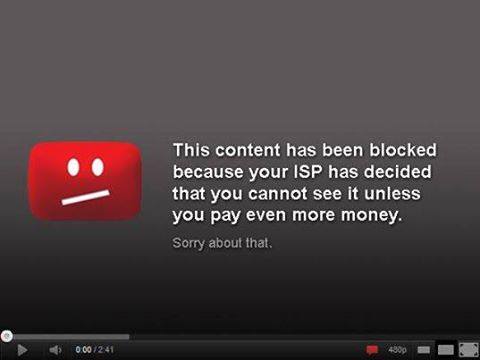SOURCE:
http://www.msn.com/en-in/news/national/why-we-need-net-neutrality/ar-AAaESrX?li=AAaVsg6
FIGHT FOR FREEDOM
OF
INTERNET CYBER WAR IS ON
The Telecom Regulatory Authority of India (Trai) Recently Sought Public Comments on Net Neutrality.







© Provided by Indian Express The Telecom Regulatory Authority of India (Trai) recently sought public comments on net neutrality.
VIDEO: AIB video on net neutrality disappears from Facebook
 Next Story
Next Story
http://www.msn.com/en-in/news/national/why-we-need-net-neutrality/ar-AAaESrX?li=AAaVsg6
FIGHT FOR FREEDOM
OF
INTERNET CYBER WAR IS ON
The Telecom Regulatory Authority of India (Trai) Recently Sought Public Comments on Net Neutrality.
Why we need net neutrality
The beauty of net neutrality
Stop Airtel Zero from 'hafta vasooli' or it…
Timeline: The net neutrality debate in…
Airtel defends data pricing, aims to bust…
Indians rally for Internet freedom…
The debate on net neutrality picked up steam in 2010, when the US Federal Communications Commission (FCC) lost its case against Comcast in the US Supreme Court.
Increasingly it is becoming clear that, for now, net neutrality advocates abroad have the upper hand.
But what about India?
Increasingly it is becoming clear that, for now, net neutrality advocates abroad have the upper hand.
But what about India?
The Telecom Regulatory Authority of India (Trai) recently sought public comments on net neutrality. This was spurred by Airtel’s move to charge for VoIP calls. This means the company offers customers internet access as a product and allocates a certain amount of data for the money paid. What you choose to do with that data should be your concern.
But Airtel now says, “You cannot use the data you paid for to use this particular service”, and would have you pay Rs 100 for the data and additional money to use a service using that very data. A simple analogy: The electricity company sells you 100 units for Rs 900, and says you could use that energy to power TVs, ACs, etc. But should you use the units sold to charge your inverter, you would need to pay extra. The comparison of electricity with the internet is relevant because both are utilities.
The carrier gets revenue by charging customers for talk-time. Additionally, it sells 2G and 3G services. Carriers have been primarily geared towards selling talk-time. Selling internet services was secondary. They have been slow to react to the potential of third-party internet services. Consumers are replacing traditional texting with WhatsApp or Viber and traditional network calling with apps such as Skype. There is a very real danger that, in five years, carriers may earn no money from texting and calling.
Carriers argue that internet penetration in India, unlike developed Western nations, is poor. Huge investments need to be made in infrastructure. The revenues from charging the customer for data will not justify making that investment. There is some merit in that argument. This is where the government will have to step in and treat internet access as a utility and make investments in infrastructure.
But market disruption has been happening for aeons. This is simply an evolution. With evolution come casualties. In the case of the internet, it is the carriers’ existing business model. They will fight to prevent that because they know of no other model to sustain profits.
Currently, the carrier treats all third-party applications the same. What happens when one third-party application is treated favourably for monetary consideration? This is paid prioritisation. Right now, the internet is a great equaliser. One website will load just as fast as another. Now imagine Google pays the carrier to get into the “fast lane”. So while, say, Yahoo takes eight seconds to load, Google takes one. The consumer is highly disincentivised from visiting Yahoo.
This will lead to a situation where financially powerful companies will pay carriers while their rivals, even with better products, will be forced to see their sites load slowly. It will lead to a collapse of the start-up market and negatively impact innovation.
The second aspect of paid prioritisation is free data. Say WhatsApp pays carriers so that the data used for the app is not counted towards the consumer’s data cap. Again, the consumer is disincentivised to use its rivals. The problem arises when a clearly inferior product is given preference. This goes against the grain of the internet, where meritocracy rules.
In light of this, Facebook and Google’s recent decision to join the COAI (Cellular Operators Association of India) is worrying. The COAI counts among its members carriers like Airtel and Vodafone, lobbying the government and Trai to do away with net neutrality. This contradicts their stance in the US, where they joined a coalition of companies to advocate for net neutrality.
Carriers must stop trying to enforce old paradigms in a new marketplace. Otherwise, they will end up on the the wrong side of history.
The writer is a recent graduate from SRCC, Delhi University
VIDEO: AIB video on net neutrality disappears from Facebook

